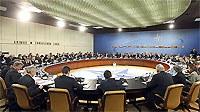Russian diplomat slams NATO exercise scenario

(RIA Novosti – December 31, 2013) Russia’s Deputy Foreign Minister Vladimir Titov has said that the scenario of NATO’s Steadfast Jazz 2013 military exercise which took place on 2-9 November has “surprised” Moscow. He made the statement in an interview with Russian state news agency RIA Novosti published on 31 December. In the same interview he also spoke about the next session of the UK-Russia strategic dialogue negotiations and outlined the current state of the effort to relax the UK-Russia visa regime.
“It is hardly appropriate today to seriously talk about some sort of attack threat being posed to a NATO country, and not just in that region [Eastern Europe]. Therefore we found surprising the scenario of NATO’s Steadfast Jazz 2013 exercise, aimed at rehearsing actions envisaged in Article 5 of the Washington Agreement and conducted in November on the Polish, Latvian and Lithuanian territory, especially as it was set against the backdrop of the Polish and Baltic states’ leadership publicly declaring that their allies were ready to protect them from the ‘Eastern threat’,” Titov said.
“We should be concerned by real security threats rather than invented ones: the growth of international terrorism, extremism and trans-border crime, the illegal proliferation of weapons, drug trafficking, cyber crime, growing discord between religions and civilizations, natural and man-made disasters,” Titov added.
Addressing the question of Russian-UK relations, Titov said that the next session of the UK-Russian strategic dialogue is to take place in spring 2014 in Moscow, as quoted by RIA Novosti earlier on the same day. He said that the talks will proceed in a two plus two format involving the defence and foreign ministers of the two countries. The session will address Russia’s relations with NATO, the situation in Syria, in the Middle East and in Afghanistan after the withdrawal of international peacekeeping forces and cooperation on settling Iran’s nuclear problem.
“Generally, it is important for us not to simply exchange opinions but to approach a common understanding where it is possible,” Titov said.
Titov also claimed that London was reluctant to step up efforts aimed at relaxing the Russia-UK visa regime, mainly due to the case of Aleksandr Litvinenko, a former Russian Federal Security Service (FSB) officer who was allegedly poisoned with polonium-210 while living in London in 2006.
“Regrettably, our partners in the UK are not yet ready to make progress down this line [with the visa regimes], citing their own migration policies and the Litvinenko case,” Titov said, as quoted in yet another report by RIA Novosti earlier on the same day.
